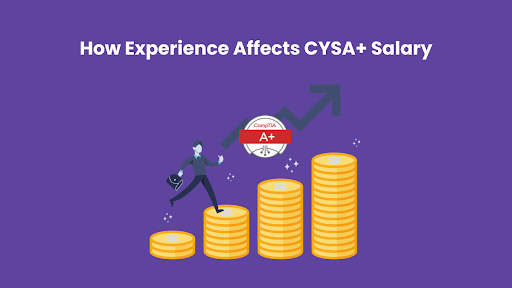In cybersecurity, the CompTIA CYSA+ certification stands as a significant milestone in a professional’s journey. But what makes this certification even more compelling is how experienced can significantly influence CYSA+ salary figures. As cybersecurity continues to be a top concern for organizations worldwide, understanding the correlation between experience and compensation is essential for those considering a career in this field. In this blog, we’ll explore how experience affects CompTIA CYSA+ Salary, shedding light on the earning potential for professionals in this sector. Also, we’ll delve into the significance of CompTIA Certification.
CompTIA CYSA+ Certification Value
Understand the CompTIA CYSA+ certification before exploring the complex relationship between experience and remuneration. The Cybersecurity Analyst (CYSA+) certificate is generally acknowledged as confirmation of cyber threat detection and mitigation expertise. The CYSA+ certification verifies your cyber defence abilities, making you more marketable in information security.
Factors Influencing CYSA+ Salary
The compensation of a CYSA+ professional depends on a number of things. While it is true that experience plays a pivotal role, it is not the only one. The salaries of CYSA+ workers might be affected by the following:
- A cyber security professional’s remuneration is heavily influenced by their level of experience in the industry. Professionals with less experience tend to make less money than those with more.
- Different parts of the world have very different needs when it comes to cybersecurity experts. Cybersecurity experts command a higher salary in areas where both the cost of living and the need for their services are high.
- The industry in which you work might affect your compensation. Large businesses, government agencies, and financial institutions may often provide better pay than small businesses and nonprofits.
- In addition to your experience and credentials, your educational background might also play a role in determining your compensation. A four-year degree or higher in the discipline is preferred.
- Some people who have passed the CYSA+ exam decide to focus their expertise on a particular area, such as incident response, threat analysis, or penetration testing. Earning potential is enhanced by specialised expertise.
- Additional certifications beyond CYSA+, such as CISSP, CISM, or CEH, might increase one’s earning potential. The breadth of expertise attested to by these credentials is impressive.
How Experience Affects CYSA+ Salary
Salary differences in the area of cybersecurity are mostly driven by years of experience. See below for a breakdown of CYSA+ wages based on years of experience:
- Entry-Level (0-2 Years): Entry-level CYSA+ professionals typically earn salaries on the lower end of the scale. Many people who work in cybersecurity get their start here. Cybersecurity analysts, junior threat analysts, and junior security consultants are typical job titles for people in this field.
- Mid-Level (3-5 Years): As professionals gain more experience, their salaries tend to increase. Professionals with a CYSA+ certification at the intermediate level may work as senior cybersecurity analysts, incident responders, or network security engineers, among other positions. Complex threat analysis and response are commonplace in their roles.
- Senior-Level (6+ Years): Professionals with extensive experience in cybersecurity can command some of the highest CYSA+ salaries. Positions at the executive level, such as security architect, cybersecurity manager, and head of security operations, often entail leadership and managerial duties. To be successful in these roles, you need in-depth knowledge of cybersecurity and the capacity to design and execute complex security measures.
- Specialised Roles: If you choose to specialise in a specific area of cybersecurity, such as penetration testing or threat intelligence, your experience and expertise in that specialisation can lead to higher salaries. Positions of specialisation usually need more expertise and the aptitude to handle novel problems.
- Geographic Variation: Keep in mind that the cost of living and the demand for cybersecurity professionals vary by location. CYSA+ professionals may make much more money in high-demand, high-cost places than they do in lower-demand, lower-cost ones.
Negotiating Your CYSA+ Salary
Knowing your worth in terms of skills, experience, and local market circumstances is crucial when negotiating a CYSA+ wage. Some advice on how to negotiate a wage effectively:
- Find out what the going rate is for CYSA+ professionals in your area and with your level of expertise by doing some research.
- Make sure your past successes and contributions are front and centre throughout negotiations. Demonstrate the good effect your background has had on previous employers.
- In addition to your CYSA+ certification, be sure to highlight any other credentials that set you apart from the competition.
- The starting pay is just one component of a compensation discussion. Think about the whole benefits package, which may include medical coverage, retirement savings, and more.
- Always be aware of and adapt to changes in the market. An advantage in negotiations is a person who is up-to-date on the latest dangers and cybersecurity advances.
Conclusion
The wage range for CYSA+ professionals mostly depends on their degree of experience. Your earning potential rises in tandem with your level of competence and experience. Your income is based not only on your experience and skills but also on your location, company, area of expertise, and level of certification. Getting the salary you’re worth in cybersecurity requires skilful negotiating and an accurate assessment of your market value. Your CYSA+ credential and subsequent work experience will make you an invaluable tool in the never-ending fight to protect businesses from cybercrime.
